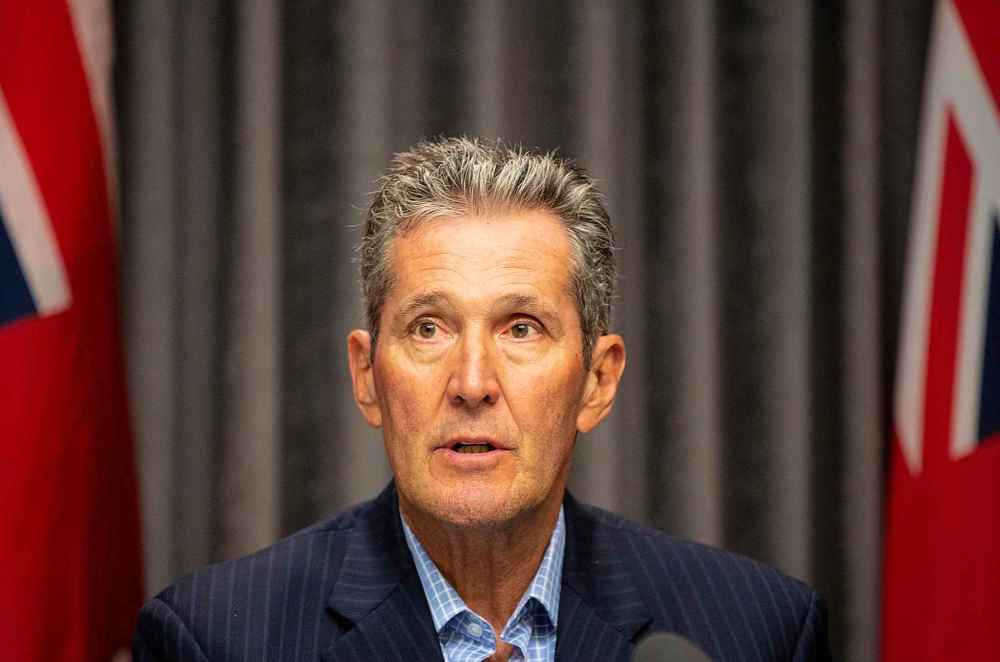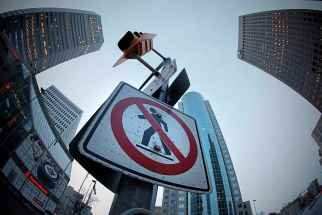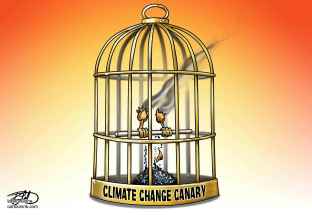Sexual harassment reported in every part of Manitoba government Minister calls survey results 'heartbreaking'
Read this article for free:
or
Already have an account? Log in here »
To continue reading, please subscribe:
Monthly Digital Subscription
$0 for the first 4 weeks*
- Enjoy unlimited reading on winnipegfreepress.com
- Read the E-Edition, our digital replica newspaper
- Access News Break, our award-winning app
- Play interactive puzzles
*No charge for 4 weeks then price increases to the regular rate of $19.00 plus GST every four weeks. Offer available to new and qualified returning subscribers only. Cancel any time.
Monthly Digital Subscription
$4.75/week*
- Enjoy unlimited reading on winnipegfreepress.com
- Read the E-Edition, our digital replica newspaper
- Access News Break, our award-winning app
- Play interactive puzzles
*Billed as $19 plus GST every four weeks. Cancel any time.
To continue reading, please subscribe:
Add Free Press access to your Brandon Sun subscription for only an additional
$1 for the first 4 weeks*
*Your next subscription payment will increase by $1.00 and you will be charged $16.99 plus GST for four weeks. After four weeks, your payment will increase to $23.99 plus GST every four weeks.
Read unlimited articles for free today:
or
Already have an account? Log in here »
Hey there, time traveller!
This article was published 09/08/2018 (2681 days ago), so information in it may no longer be current.
More than 500 Manitoba government workers — most of them women — came forward this spring to report that they had been sexually harassed on the job.
Of those who reported sexual harassment, one in 10 said they were currently experiencing it and 90 per cent said they had experienced it on multiple occasions.
The employees were responding to an anonymous online survey developed by the Manitoba Status of Women Secretariat and the province’s Civil Service Commission.
Sexual harassment in Manitoba’s civil service
3,028: the number of persons who participated in the voluntary online survey
17 : the percentage who said they had experienced sexual harassment while working for the Manitoba government
82: the percentage of those who experienced sexual harassment who identified as female
10: the percentage of those who had experienced sexual harassment who said they were currently being harassed
34: the percentage who said they were sexually harassed by a co-worker
19: the percentage who were harassed by someone in a position of authority other than a direct supervisor
70: the percentage of survey respondents who did not report the sexual harassment
— Source: Manitoba Government Employee Consultations on Sexual Harassment in the Workplace
Premier Brian Pallister said the results are “a tremendously strong indication” that the issue of sexual harassment deserves the government’s full attention.
“Everyone deserves to know that they will be safe and respected in the workplace,” he told a news conference.
The province released two reports on harassment in the government workplace Thursday. One reported on the results of employee consultations on sexual harassment, while the other, from an outside consultant, reviewed government policies and procedures regarding harassment in general, listing 25 recommendations for improvement.
In May, the government conducted 13 roundtable meetings on sexual harassment attended by 166 employees, while 3,028 government workers — about a quarter of the workforce — anonymously completed the online survey.
Rochelle Squires, the minister responsible for the status of women, called the results “heartbreaking.”
“The response was incredible. We had over 3,000 employees share their experiences with us. And from this we confirmed that sexual harassment affects every part of the Manitoba government,” she said.
One-third of the sexual harassment perpetrators were co-workers while 19 per cent were someone else in a position of authority, 15 per cent were direct supervisors and 15 per cent were subordinates. Some 14 per cent of perpetrators were from outside the civil service.
The most frequent types of sexual harassment were inappropriate contact (leering and invading personal space) and physical contact (touching, patting and pinching).
At the time of the harassment, 35 per cent of respondents were working in Manitoba Justice, which includes corrections workers; 16 per cent in the Department of Families; and 10 per cent in Sustainable Development.

Forty-four per cent said the harassment occurred more than three years ago, while 40 per cent said it had happened within the past three years.
Seventy per cent of respondents said they did not report the harassment for a host or reasons, including fear of reprisal or negative implications for their career, a lack of trust that change would occur, or a feeling that the harassment was not serious enough.
About one-quarter of those who did report sexual harassment said no further action was taken after they went forward. Only 13 per cent said they were satisfied with the resolution or actions taken.
In a separate report by outside consultant MLT Aikins, the government was urged to make use of “in-person training as frequently as possible” in combating workplace harassment. The vast majority of government workers surveyed had completed the mandatory online training, but most felt it was ineffective.
The consultant also said that employee training should be recurrent and regular and that those designated to receive employee complaints should receive separate training. It also recommended that the roles and responsibilities of employees in minimizing workplace harassment be clarified. And it said that the government’s “no wrong door” initiative for reporting harassment should be maintained and assessed.
Pallister said employee training is critical. “We really need to change the culture because people should not be afraid to report incidences of harassment,” he said.

In June, the government reported that hundreds of investigations and allegations of workplace harassment had been brought forward by civil servants and government political staff in the previous fiscal year. Of the 378 internal investigations carried out, 12 had to do with sexual harassment, 80 involved harassment or bullying and 286 were related to other forms of misconduct.
The Progressive Conservative government has promised to issue similar reports annually.
Pallister said Thursday that when it comes to dealing with harassment, politicians and political staff will not be treated differently than civil servants.
“There is no two-tier harassment policy that’s going to happen under this government,” he said.
While he acknowledged that the online survey was not scientific, Pallister said that “doesn’t undermine that the incidents are occurring.”
Michelle Gawronsky, president of the Manitoba Government and General Employees’ Union, said she is pleased to see the government undertake initiatives to combat workplace harassment.
“We just received the reports, and will be carefully reviewing the recommendations,” she said in a statement. “We are hopeful this initiative will mean that workers can come forward with concerns, and feel safe and free from reprisal, when reporting harassment.”
larry.kusch@freepress.mb.ca

Our newsroom depends on a growing audience of readers to power our journalism. If you are not a paid reader, please consider becoming a subscriber.
Our newsroom depends on its audience of readers to power our journalism. Thank you for your support.









